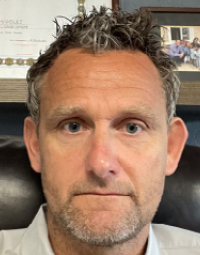Marc Hansult: Here Today, Ghana Tomorrow
Marc Hansult is co-founder and co-chief executive officer with DTRT (Do The Right Thing) Apparel, a sports and lifestyle apparel development and manufacturing company.
Responsibilities: Defining and driving execution of company vision and strategy; overseeing all aspects of global business development, including supply chain and factory operations, sales and marketing, and product development.
Experience: Managing director, head of global business development and merchandising, Winds Enterprises; owner, Just4Fun & Sports; tennis pro.
Atypical career path wouldn’t take you from being a tennis pro in Europe to co-founding an apparel factory in Africa. But that has been my career path.
When I was younger, I played tennis professionally in Germany. I achieved a certain level of success, but not so much that I could retire in my 20s. I returned to school and then, in 2004, joined a company focused on product development and manufacturing for apparel and sports accessories brands.
At the time, third-party factories in Asia did most of the manufacturing. But as costs went up and brands were forced to adjust their sourcing networks, we looked at Ghana, Africa.
In 2013, I co-founded DTRT to set an example that theapparel manufacturing industry has tremendous power to do good, drive a positive social impact, and be an effective driver for positive change. That’s where the company name comes from: Do The Right Thing.
We wanted to locate DTRT where it could be cost competitive, while paying wages that could lift people out of poverty. We also invest in development of our people’s technical sewing abilities, as well as their soft skills in terms of understanding what it means to be part of the formal workforce.
Africa has a huge labor force, high unemployment, and low cost of labor. If we would have set up our factory in Bangladesh or Vietnam, and put out a sign, it would have attracted hundreds of employees with years of sewing experience. That’s simply not the case in Ghana. It wasn’t a surprise, but it has been a challenge.
Our core business is original equipment manufacturing (OEM). Clients give us their specifications and DTRT develops the product. Then we make it and ship it freight-on-board; clients handle sales and distribution.
In August 2014, the company shipped its first container. Today it employs 2,700 people and has become one of the largest private employers in Ghana, with a workforce that is 98% local.
Because Ghana has limited capabilities for fabric production and trim or even shipping cartons, DTRT sources these products from China. The Ghana facility handles product assembly, or what we call CMT, or Cut-Make-Trim.
When DTRT started, we had a very strong relationship with one customer who bought into our vision. The company still faced challenges in getting to profitability and relevance as a business. A high percentage of employees had never worked before. Increasing productivity has required a significant investment of time and money.
However, DTRT believes Africa is where the industry is moving. Moreover, in Ghana, we can pay wages that are above poverty levels. It’s English-speaking, politically stable, and located on the west coast of Africa, which shortens transit times to Europe and the United States.
Because demand from that first customer was so strong, we focused on that company for the first few years, and then added a second customer in 2020. Both are billion-dollar apparel companies and offer tremendous growth opportunities. We’re also talking to others to expand the customer base.
Now, the company is looking into bringing a textile mill to Ghana. Vertical expansion would shorten lead times. In addition, the technology uses about 90% less water than traditional mills. We’re excited about it and confident that by late 2023 we’ll start making that a reality.
Once the mill is built, we hope Ghana will become a more attractive investment destination for other companies, as well. Then, we’re not talking about creating 5,000 or 10,000 jobs; we’re talking about creating 100,000 jobs.n
Marc Hansult Answers the Big Questions
1. What is one thing you wish you’d known before you started DTRT?
If we would have anticipated the limitations to available financing, we could have addressed them more proactively.
2. If you could have one super power what would it be?
Aggressiveness. I would have apparel brands be even more aggressive in building a sustainable industry.
3. What’s the best supply chain or leadership advice you ever received?
When aligning with partners, keep a long-term perspective and a partnership mindset, rather than a transactional mindset.
4. Do you have a guilty pleasure?
Sports is my passion. I work out and play basketball and tennis.

